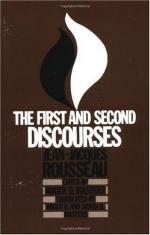|
This section contains 959 words (approx. 3 pages at 400 words per page) |

|
Rousseau: Ancient, Enlightened and Romantic
Rousseau combines a variety of philosophical traditions that were influential in 18th century France and that are still influential in the present day. First, Rousseau displays many affinities with ancient philosophers like Aristotle and medieval philosophers like Thomas Aquinas. He believed that the best communities were small and virtuous, focusing on the common good. While he was a democrat, he still believed that the state should aim at a single end of the common good, just as the ancients and medieval did. He also is a critic of modernity, arguing that humans were happier in less technologically and economically developed times. The critique of modernity and love of virtue are prominently featured in the First and Second Discourses.
Rousseau is best known as a representative of the Enlightenment, however. The Enlightenment emphasizes the unlimited power of human reason, human political equality and the innate...
|
This section contains 959 words (approx. 3 pages at 400 words per page) |

|




